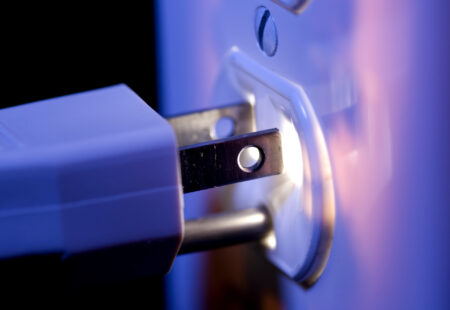Electrical outlets are an important part of any household. They are responsible for powering everything from essential appliances to personal electronics. When one fails to work, it can be a safety issue and a major inconvenience. You will want to identify the root cause of a failing electrical outlet to keep your home working efficiently. Here are a few possible reasons why your electrical outlet is not working.
Tripped Circuit Breaker or Outlet
Circuit breakers are designed to cut off the flow of electricity when they detect an overload or short circuit, which can prevent potential fires. If an outlet suddenly stops working, your first step is to check the breaker panel. Once you locate the tripped breaker, see if the position is switched to “On” or “Off.” Resetting the breaker by switching it off and then back on may restore power to the outlet.
You might also want to check the Ground Fault Circuit Interrupter (GFCI) outlets to see if they have tripped. These outlets are installed in moisture-prone areas, such as kitchens, bathrooms, and outdoor locations. When there is a ground fault, they will trip and cut off power to stop an electrical shock. Pressing the reset button on the outlet can restore its functionality. However, if you have issues with frequent tripping, that could indicate an underlying issue with the wiring or connected devices.
Check the Arc Fault Circuit Interrupters (AFCIs), too. If one of these components detects arc faults, such as an electrical current flowing through an unintended path, it can trip. You will find most AFCIs in newer homes as an added safety feature. If an AFCI trips, it will cut off power to the outlet like a GFCI does. Resetting the AFCI at the breaker panel may restore power. Once again, if it trips frequently, you could have a problem that needs a professional to investigate it.
Loose or Faulty Wiring
Defective or loose wiring can also cause an electrical outlet to stop working. Over time, the connections inside an outlet can loosen due to vibration, frequent use, or improper installation. As a result, you might have intermittent power or complete failure. An electrician can inspect for loose connections by turning off the power at the breaker panel and examining the wiring.
In some cases, you could have damaged wiring due to rodent activity, accidental puncturing during construction, or natural wear and tear. If the wiring is damaged, it can disrupt the flow of electricity to an outlet. In turn, your outlet will be nonfunctional. If this is the case, consult a licensed electrician. Attempting to repair or replace damaged wiring can be extremely dangerous.
Issues With the Outlet
In some cases, the outlet itself may have problems due to a manufacturing defect or damage. Charring, burning smells, or visible damage to the plastic housing all indicate that your outlet is defective. If you see these signs, contact an electrician for a replacement.
However, not all outlet problems are the result of a defective component. Your outlet might have been overloaded. This can happen when too many devices are connected to a single circuit, which can exceed its capacity. In these situations, the circuit breaker will trip repeatedly. If left unchecked, it can damage the wiring and outlets. You may want to disconnect some appliances and see if the outlet begins to work again. If that does not resolve the issues, you might need further inspection by a trusted repair company.
Wear and Tear of Components
Outlets will wear out over time, especially in high-traffic areas. If you have a worn-out receptacle that does not make proper contact with plugs, you will have a poor connection or none at all. When you insert a plug, it should feel tight. Any loose plugs or ones that work only intermittently need to be replaced.
The outlet box that houses the electrical connections can also become loose over time. When this happens, the outlets can shift. If the outlet moves when a plug is inserted, you might need to tighten or replace the screws that hold the box in place.
Age of the Electrical System
Older systems may not be able to handle modern electrical loads. As a result, you might experience frequent outages or nonworking outlets. If your home has an outdated electrical system, it may be time to consider an upgrade. Consulting an electrician about your system can improve reliability and ensure that your outlets work effectively, efficiently, and whenever you need them to.
Electrical Surges
Electrical surges from lightning strikes, power outages, or faulty appliances can damage outlets and the devices connected to them. In some situations, it can fry the internal components. If you believe a surge occurred in your home, you might want to unplug any connected devices and test the outlet with a different appliance. If the outlet remains nonfunctional, you will probably have to replace it. Surges can be detrimental to your home, which is why you may want to install protectors that can help prevent damage from future incidents.
Corrosion Due to Moisture
While you might have outlets that detect and trip if moisture is detected, older homes don’t always have these features. If the outlet is near a place with high humidity, moisture can cause corrosion of the metal contacts inside the outlet. You will be left with poor connections or complete failure of the component. Take a look at your outlet; you can usually spot corrosion caused by green or white residue on the contacts.
Faulty Appliances
In some cases, the issue may not be with the outlet but with the connected appliance. A faulty appliance can cause the outlet to appear nonfunctional if it fails to draw power. You can also check by testing the outlet with a different device to see if the problem is with the outlet or the appliance. If the new device works, the original appliance may need repair or replacement.
Breaker Box Issues
In some cases, you could have an issue with the breaker box. A damaged or faulty breaker box can affect the entire circuit, including the outlet. Issues with the breaker box are not a do-it-yourself project. You need to contact a qualified electrician to diagnose the problem and repair or replace the box.
Outlet Cover Issues
Sometimes, a nonworking outlet can be attributed to issues with the outlet cover plate itself. A damaged or improperly installed cover plate can interfere with the proper operation. For example, if the cover plate is cracked or misaligned, it might put pressure on the outlet. That, in turn, can make it difficult for plugs to make proper contact.
While these issues may seem like a simple fix, you need licensed and skilled professionals for the job. When you need someone to inspect the outlets in your home in Jerome, ID or throughout the Magic Valley or Treasure Valley, count on the licensed electricians at [company_name]. Since 2013, we have focused on providing comprehensive customer-focused electrical, plumbing, heating, and cooling services.
When an issue with your switch or electrical system pops up, call the knowledgeable and skilled team at [company_name] for assistance.


